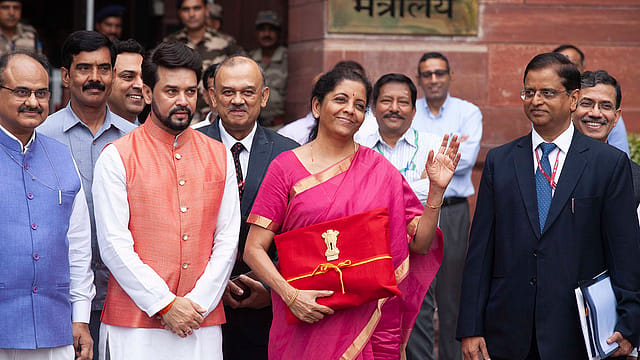Budget 2019: Experts’ opinion
ADVERTISEMENT

Finance minister Nirmala Sitharaman presented her maiden Budget in the Lok Sabha on Friday. Here is what experts think about it:
Shyamal Mukherjee, chairman - PwC India
The Finance Minister’s Budget speech re-iterates the government’s thrust on minimum government and maximum governance. Ramping up infrastructure investments to ₹20 lakh crores a year would help India move to the 8% growth trajectory. The proposed Expert Committee will have a critical role to play in channeling long term private capital to meet this need. Resource mobilisation through further disinvestment and increase in tax rates, and encouraging banks to take risks in lending to NBFCs through partial guarantees to ease credit flow is likely to have a positive impact. The focus given to the MSMEs and the rural sector is welcome.
S.R. Patnaik, partner and head, taxation, Cyril Amarchand Mangaldas
The Budget has proposed several amendments to promote a cashless economy. Apart from making amendments to several sections across Income Tax Act to include electronic mode of payment, a 2% levy of TDS has been proposed on cash payments in excess of ₹1 crore made during a year. Similarly, new provisions are proposed which would make it mandatory for every person to provide facility for accepting electronic mode
Saumil Shah, partner, Dhruva Advisors
Big emphasis and reliance on "big data". Push to digital economy, e-assessments, faceless scrutiny and pre-filled tax returns are big moves but marginally tough in terms of compliance.
Amit Gupta, director, Deloitte
The Budget places a holistic focus on demand for connectivity across rural and urban markets. RRTS, metro rail, and TOD are expected to improve connectivity to congested urban agglomeration and foster development outside cluttered city centres. The key to success, however, lies in leveraging private sector developments and ensuring coordination across multiple development authorities and alignment of objectives. Similarly, building large infrastructure projects and affordable housing on large land parcels through pooling/joint models by central/state agencies—as announced in the Budget—will need leadership and monitoring, possibly through empowered programme/project-focussed agencies.
Yogesh Chande, partner, Shardul Amarchand Mangaldas
On Increase in minimum level of public shareholding of listed companies from 25% to 35%:
Historically speaking, India has been a promoter-driven market and increasing the threshold will ensure wider ownership through institutional investors, more market depth, better price discovery and hopefully will enhance the corporate governance standards.
This will potentially also be a concern of several listed companies with promoter shareholding at around 75% e.g. MNCs. Promoters of such companies may want to explore options to delist such companies, unless they are fine with increasing the public shareholding by another 10%. At 65% promoter shareholding, it will also be an additional hurdle to be crossed by a promoter, if a promoter was to attempt delisting i.e. reaching 90% through the book building route from 65%, than from 75%.
The number of "OFS through stock exchange mechanism" will perhaps increase to dilute the promoter shareholding from 75% to 65%, as it is one of the fastest and cheapest way to dilute promoters shareholding, as compared to other modes available to increase the public shareholding.
On relaxed KYC norms for FPIs
Hopefully, this will give some relief to those FPIs who were otherwise sceptical in sharing some of their KYC details and were therefore shying away from the Indian securities markets. Devil will however be in the details of such relaxed norms.
Peeyush Naidu, partner, Deloitte
The Budget speech duly emphasised the importance of infrastructure and connectivity to the Indian economy—in terms of enhancing and taking forward programmes across various key infrastructure sub-sectors. While budgetary allocations and priorities will have to be studied in detail, I believe that the Budget’s focus on comprehensive plans and blueprints for various infrastructure plans/ grids is a welcome one—especially in the context of:
(1) considering systemic trade-offs and development of economic and efficient infrastructure, and
(2) involving private sector in this area in a bigger way on a long-term basis.
Atul Pandey, partner, Khaitan & Co
Government’s proposal to relax FDI norms for sectors such as media, aviation, insurance, and single-brand retail will attract more overseas investment and boost India as a preferred FDI destination. The government will examine suggestions of further opening up of FDI in aviation, media, AVGC (Animation, Visual effects, Gaming and Comics) and insurance sector in consultation with stakeholders.
Moin Ladha, partner, Khaitan & Co
Inter-operability of platforms between RBI, SEBI will be improved. This will certainly enable both regulators to improve their enforcement process and take timely action for any alleged non-compliances.
Increase in public shareholding to 35% takes away the ability to unilaterally manage companies with ability to pass special resolutions . This will enable public shareholders to have a say. Also some companies may consider going private by making de-listing offers.
Bhavik Narsana, partner, Khaitan & Co
The focus of the Budget has rightly been on connectivity and infrastructure. Creation of jobs can be a consequential benefit.
Foreign investment (both FDI and FPI) liberalisation is well-intended and timely. The government needs to continue improving ease of doing business and provide a predictable business environment.
Vinita Krishnan, director, Khaitan & Co
Budget 2019 is a Budget for all: Pragmatic reforms across infrastructure, capital market (including foreign and non-resident investors), social sector, unorganised sector, education, rural as well as urban India.